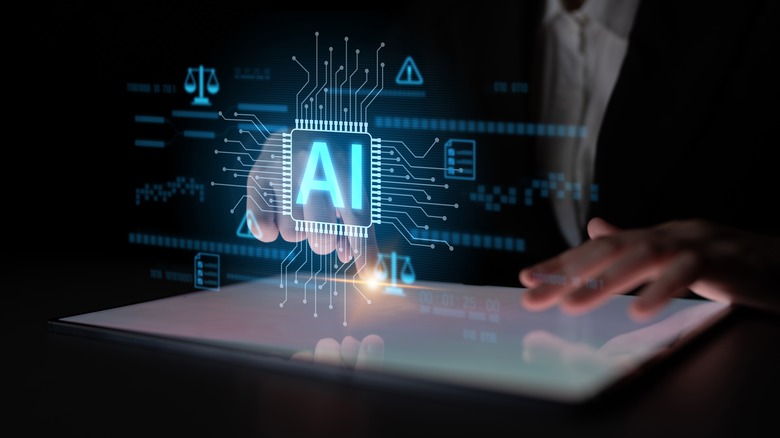4 Careers That Will Be Essential In The Age Of AI
The threat of the AI takeover is real. With job losses on the rise in the U.S., many are pointing the finger at AI as a key culprit. People are scrambling to determine if their jobs are safe and if they should be upskilling to ensure they remain valuable in whatever variation of their position exists in the future. Meanwhile, the younger generation is figuring out what education and training paths to pursue for a job that will still be around once they're ready to enter the working world.
There's no doubt that some jobs are at high risk for becoming obsolete due to everything AI can do, like interpreters and translators, customer service and call center representatives, ticket agents, and travel clerks. Basically, the jobs most at risk of being replaced are those the Godfather of AI, Geoffrey Hinton, deems "mundane intellectual labor." But if you're looking for a route to the best possible job security, some jobs are high on the list for being safest from the juggernaut that is automation, robots, and AI. Let's dive into four of the most "AI-proof" career paths for the future.
Medical professionals aren't going anywhere
AI, like the Google-built medical AI that can train itself, can and does play a crucial role in the medical field. For example, AI can scan through thousands of medical research reports to help diagnose a rare condition faster than dozens of human doctors can. But there's still a need for doctors, nurses, nurse practitioners, and other medical staff.
That's because a huge part of the relationship between doctors and patients is indeed that relationship. It involves empathy, especially with family doctors and pediatricians. Diagnosing a medical issue or discovering what someone's symptoms are is about more than going down a checklist of predetermined questions and checking vitals. It's called health "care" for a reason and often requires medical professionals to read between the lines.
AI can certainly play a role in the medical field, and it already does. But it can never replace the actual professional who relies as much on their intuition and assessing a situation in front of them as they do on their medical knowledge, skill, and training.
Robots can't handle therapy
There have been horror stories about AI therapists doling out incorrect, even potentially damaging advice, sometimes going as far as validating a patient's negative thoughts. Therapy is one of the most nuanced professions. It requires a particular knack for diving deep into someone's mind, thoughts, and feelings. It's not just what they're saying but also how they're saying it, their mannerisms, intonation, even relating stories to past ones and gauging progress over time. This is something an AI is not capable of.
While some AI systems can purportedly understand complex human emotions, being able to link together thoughts and feelings throughout several sessions and pick up on subtleties is not something AI can do. Plus, there are ethical concerns, not to mention the lack of human connection that's at the center of therapy and mental health treatment in the first place.
AI is a tool that can help therapists navigate complex details about a patient or explore studies to further their own understanding of rising mental health issues. It might even be useful in helping people get through minor bouts of depression or feelings of loneliness. But as a long-term solution, it can't replace the therapists themselves.
Creative work transcends AI
This one is controversial, but near and dear to many. Some say creative jobs, like musicians, actors, artists, writers, and journalists, are at risk of being taken over by AI. It's already happening in some areas, like with AI music generation through OpenAI. Publications are releasing content written by AI (to varying degrees of success and credibility) while Hollywood is up in arms about AI actress Tilly Norwood. But creative jobs are just that, creative.
AI can be taught and can acquire information from the depths of the internet. But that information comes from human creativity. What's more, while AI has become more conversational in style and can create content with a specific tone, even a feigned personality, it's often easy to spot.
AI will be, and already is being, used in creative professions. But creating content that resonates with people requires understanding human emotions. Desires, styles, and subjective tastes are always changing. Humans can tap into that, drive trends, and express sentiment. AI can only provide static and robotic content that removes all the creativity from the creative process.
Personal services need connection
There is a range of personal service jobs that might be replaced by robots. Think of the hostess at a hotel or restaurant, even a bank teller or grocery store clerk. But some service jobs require a specific personal touch, which includes professions like hairdressers, cosmetologists, personal trainers, and coaches.
These jobs thrive on human connection. Sure, there are AI-powered fitness services, like apps for working out from home or automated programs at the gym. But they lack someone in front of you, a key motivating factor, or even a mood booster. Can you imagine a baseball team making it to the World Series without human coaches to guide them?
AI has so much potential to automate mundane, repetitive tasks, giving the most skilled and knowledgeable professionals more time to work on the most important aspects of their jobs. It can help a bartender learn new drink recipes or help personal trainers develop a specific workout plan for a client. But the human connection will still be required and vital for these professions.




